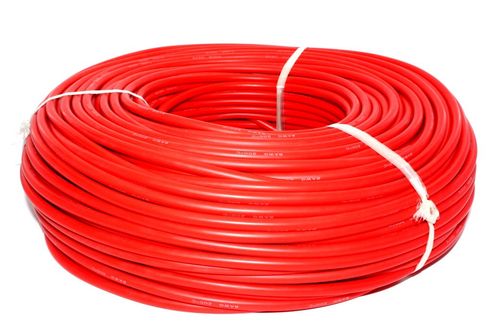In today's industrial landscape, the demand for efficiency and reliability is at an all-time high. As industries continue to adopt automation technologies, choosing the right materials for wiring and electrical components becomes critical. One such material that stands out is silicone insulated wire. Known for its exceptional durability, high-temperature resistance, and flexibility, silicone wire is a preferred choice in many automation systems. In this article, we’ll explore how silicone wire contributes to industrial automation and why it’s a crucial component for enhancing production efficiency.
Why Silicone Wire is Essential in Automation
1. Heat Resistance for Extreme Environments
Silicone wire is renowned for its ability to withstand extreme temperatures, ranging from -60°C to +200°C. In industrial automation, where machines often generate heat and operate under high temperatures, traditional wires can become brittle or even melt. Silicone insulated wire, however, maintains its integrity and performance even under these harsh conditions. This makes it ideal for use in high-temperature machinery, furnaces, and other industrial equipment, helping to prevent costly breakdowns and delays.
2. Durability and Flexibility
Another key feature of silicone wire is its durability and flexibility. Unlike many traditional wires that can break or wear out over time, silicone rubber wire remains flexible even after prolonged use. This flexibility is crucial in industrial automation, where wiring needs to adapt to the movement of machines without compromising on performance. Silicone wire also offers excellent resistance to aging, weather, and UV radiation, making it suitable for long-term applications in both indoor and outdoor environments.
3. Chemical and Moisture Resistance
Industrial environments often expose wires to chemicals, oils, and moisture, which can degrade standard wires. Silicone wire, on the other hand, offers superior resistance to these substances, ensuring stable performance even in harsh chemical environments. This resistance not only prolongs the life of the wire but also reduces the need for frequent replacements, thus lowering maintenance costs and enhancing the overall efficiency of automated systems.
Applications of Silicone Wire in Industrial Automation
Robotics and High-Temperature Equipment
Silicone wire manufacturers design these wires to be used in applications that demand both flexibility and temperature resilience. For example, in robotic arms and automated machinery, the constant movement requires a wire that can bend without breaking, while also withstanding the heat generated during operation. Silicone insulated wire is an ideal solution for such systems, ensuring that automation equipment runs smoothly without interruption.
Heavy-Duty Electrical Systems
Industrial automation systems often rely on heavy-duty electrical wiring for consistent power transmission. Silicone rubber wire, with its ability to endure extreme conditions, provides a stable and reliable connection in heavy-duty equipment such as conveyors, automated production lines, and assembly robots.
Cost and Availability of Silicone Wire
When it comes to pricing, the silicone wire price can vary based on factors such as gauge size, insulation thickness, and application requirements. Despite being slightly more expensive than standard wires, the long-term benefits of reduced downtime, maintenance costs, and improved system efficiency make it a cost-effective investment for industrial automation.
Additionally, silicone wire manufacturers offer a wide range of options to suit different industrial needs. Whether you need silicone insulated wire for high-temperature environments or heavy-duty applications, silicone rubber wire provides the versatility and performance needed for modern automation systems.
Conclusion:
Silicone wire plays a vital role in enhancing the efficiency and reliability of industrial automation systems. Its heat resistance, durability, flexibility, and chemical resistance make it an ideal choice for a variety of high-performance applications. As industrial automation continues to evolve, the demand for robust and reliable materials like silicone wire will only increase. Investing in high-quality silicone insulated wire from trusted silicone wire manufacturers is an essential step toward optimizing production processes and reducing downtime. Whether you are looking for durable wiring solutions or comparing silicone wire prices, silicone rubber wire remains one of the best choices for advanced industrial applications



